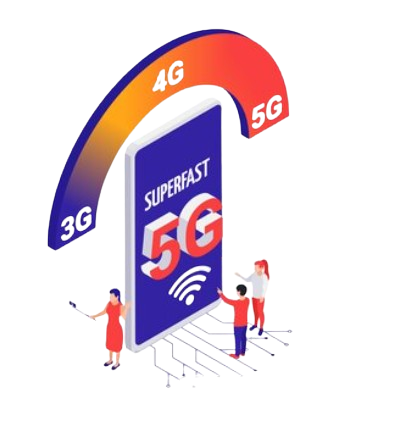5G is undeniably transforming mobile app performance. From faster speeds and reduced latency to enabling real-time interactions and immersive experiences, mobile apps are evolving to meet the demands of modern users. As a result, businesses need to consider 5G’s capabilities when developing their mobile apps to stay competitive in an increasingly digital world.
The advent of 5G technology is revolutionizing industries across the globe, with mobile app performance being one of the key beneficiaries. As mobile networks upgrade to 5G, developers and users alike are noticing massive improvements in speed, connectivity, and functionality. In this blog, we will explore how 5G impacts mobile app performance, how it enhances the user experience, and what businesses can do to take full advantage of these changes.
-
Faster Speeds and Reduced Latency
One of the most significant improvements 5G brings to mobile app performance is lightning-fast download and upload speeds. With 5G, mobile users can expect significantly faster internet connectivity than ever before. Apps that require large data transfers, such as video streaming, gaming, or cloud-based applications, will experience minimal delays. The reduced latency provided by 5G allows real-time communication and quicker data processing, which is essential for apps that rely on instant feedback. As a result, mobile app performance has seen a notable enhancement, benefiting both developers and end-users.
-
Enhanced User Experience with Real-Time Interactions
With the increased speed and reliability of 5G, real-time interactions are now smoother than ever. Mobile apps like video conferencing tools, social media platforms, and gaming apps are all optimized to offer instant communication and interactions. Mobile app performance improves as the need for buffering and lag decreases. For users, this means an uninterrupted experience that feels seamless, no matter how complex the app’s functionality is. Real-time data syncing between devices is faster, making collaborative apps even more efficient. As this technology matures, mobile performance will continue to evolve, offering an entirely new level of user satisfaction.

-
More Robust App Features
5G enables developers to create more complex and resource-heavy app features without sacrificing performance. Mobile apps are no longer limited to basic functionalities, and with 5G, the potential for app development is limitless. This next-gen network supports augmented reality (AR), virtual reality (VR), and other high-bandwidth features that demand exceptional performance. Applications that rely on immersive experiences, like AR games or virtual meetings, benefit the most from the faster speeds and lower latency of 5G networks. As 5G continues to expand, more advanced app features will be integrated, all with enhanced mobile app performance.
-
Improved Battery Life
A crucial aspect of mobile app performance is battery consumption. With 5G, not only does performance increase, but power efficiency also improves. Although early versions of 4G networks drained battery life, 5G technology has been designed to be more power-efficient. This means that apps can run smoother for longer periods without taxing the device’s battery. With faster data speeds and reduced energy consumption, users can engage with apps more frequently, improving the overall user experience. As battery performance improves alongside network enhancements, mobile app performance reaches new levels of efficiency.
-
Cloud Integration and Edge Computing
5G’s high-speed connectivity is instrumental in enabling seamless cloud integration and edge computing for mobile apps. With the power of cloud computing, mobile apps can offload demanding tasks to remote servers, enhancing the device’s overall performance. Edge computing, which processes data closer to the user, further boosts app performance by reducing response times and improving reliability. Together, 5G, cloud, and edge computing enhance the overall app experience. Real-time data processing, combined with low latency and fast speeds, allows mobile apps to process information quickly and effectively, improving their functionality. Cloud-based apps will also benefit from 5G’s ability to deliver faster and more reliable performance.
Conclusion
5G is undeniably transforming mobile app performance. From faster speeds and reduced latency to enabling real-time interactions and immersive experiences, mobile apps are evolving to meet the demands of modern users. As a result, businesses need to consider 5G’s capabilities when developing their mobile apps to stay competitive in an increasingly digital world.
At Tanbits, we understand how important it is for businesses to leverage cutting-edge technology like 5G to improve mobile app performance and user satisfaction.
With the evolution of 5G, businesses have the opportunity to push the boundaries of app development, creating experiences that were once considered impossible. The full potential of mobile app performance will unfold as 5G networks become widely available, ensuring mobile apps stay at the forefront of innovation.
BACK










